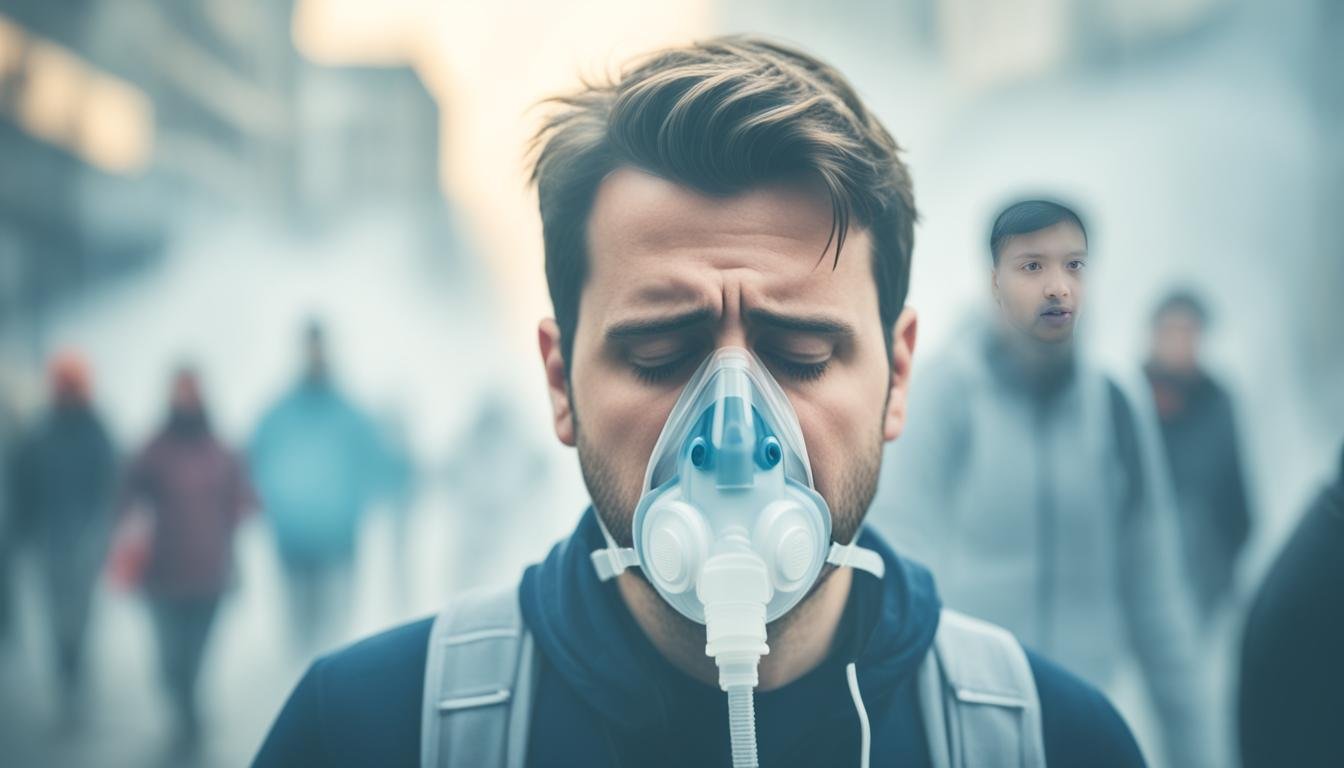Bronchitis is the swelling of the tubes that move air to and from the lungs. This can cause a cough and mucus. It might be short-term (acute), like a chest cold, which usually gets better within 1-2 weeks. Or it could be long-term (chronic), needing ongoing treatment.1
Acute bronchitis comes from viruses or bacteria, and things like smoking or pollution can add to the risk. It doesn’t usually leave lasting effects once it clears. On the other hand, chronic bronchitis is more severe and needs a doctor’s care.
Key Takeaways
- Acute bronchitis typically resolves within 1-2 weeks without lasting effects.
- Chronic bronchitis is defined by a persistent, productive cough that lasts at least 3 months with recurring bouts for 2 or more years.
- Cigarette smoke, low immunity, occupational exposures, and GERD are major risk factors for developing bronchitis.
- Antibiotics are not effective for treating most cases of bronchitis, which are usually caused by viruses.
- Preventive measures like avoiding smoke, getting vaccinated, and wearing masks can help reduce the risk of bronchitis.
Understanding Bronchitis
Bronchitis affects the breathing tubes to and from your lungs. It causes them to swell and become inflamed. This results in more mucus and a lasting cough. According to the National Heart, Lung, and Blood Institute, bronchitis can be either acute or chronic.2 Acute bronchitis is usually due to a viral infection and typically goes away in 1-2 weeks. Chronic bronchitis, however, involves a cough that lasts over 3 months, returning for more than 2 years.1
Definition and Overview
1 Chronic bronchitis means having a productive cough for more than 3 months and it happens for over 2 years. It’s often linked to chronic obstructive pulmonary disease (COPD), causing breathing troubles.
Types: Acute vs. Chronic
There are two main types of bronchitis: acute and chronic.2 Acute bronchitis, often called a “chest cold,” is common and caused by a viral infection. It gets better in 1-2 weeks, but the cough might stick around longer.2 Chronic bronchitis, though, is more severe. It means a cough that produces mucus for over 3 months, returning for 2 years or more.1 Getting ongoing medical care is often necessary for chronic bronchitis.
Symptoms of Bronchitis
Common Symptoms in Acute Bronchitis
The main signs of acute bronchitis are a cough and mucus. This mucus might be clear, white, yellow, or green. You may also feel tired, have trouble breathing, and feel a slight fever and chills. There might be chest pain too.1 Patients could also have cold-like symptoms, like a light headache or body aches. Most symptoms get better in about a week. But, the cough can last several weeks more.3
Persistent Symptoms in Chronic Bronchitis
With chronic bronchitis, you get a long cough that makes mucus for over 3 months a year. This keeps up for at least 2 years.2 Along with the cough, you may have constant mucus, trouble breathing, and chest pain.2 At times, the symptoms can worsen suddenly. These flare-ups can be bad and need doctor’s help. Infections or irritants often trigger these episodes.3
What is Bronchitis?
Bronchitis is a breathing condition that affects the bronchial tubes. These tubes help air move in and out of the lungs. When they get inflamed, more mucus is made, and a cough that won’t go away starts. This makes breathing hard. There are two types: acute and chronic. Acute comes on fast and usually goes away in a few weeks. Chronic lasts a long time, sometimes years.1 Viruses and bacteria often cause acute bronchitis. But, breathing in things like smoke or pollution for years can lead to chronic bronchitis.1
It’s important to know the definition and overview of bronchitis. This helps people identify their symptoms’ seriousness. It also encourages them to get the right help when needed.
Causes of Bronchitis
The top cause of acute bronchitis is a viral infection. It’s often from the same viruses as colds or flu.4 These viruses make the bronchial tubes swell and produce extra mucus. You end up with a stubborn cough. Sometimes, it’s bacteria that leads to acute bronchitis, but that’s rare.4 Antibiotics aren’t helpful against viral bronchitis; they work on bacteria only.
Viral and Bacterial Infections
Aside from infections, things around us can also start bronchitis.1 Breathing in air pollution, chemical fumes, and irritants can inflame our bronchial tubes.2 Smoking greatly raises one’s chances of getting bronchitis, both the acute and long-lasting kinds.1 And, breathing in secondhand smoke is also risky.
Environmental Factors and Smoking
If bronchitis sticks around for a long time, it’s called chronic bronchitis. This is part of a bigger problem called COPD, often because of smoking.1 Long-term smoking or being around cigarette and marijuana smoke can lead to chronic bronchitis.2 Women who smoke are more likely to develop it than men.

Risk Factors for Bronchitis
Smoking is a major risk for both acute and chronic bronchitis. This includes personal smoking and exposure to secondhand smoke. The toxins in smoke damage the bronchial tubes, increasing the risk.1
Compromised Immune System
People with weak immune systems face a higher risk of bronchitis. Among them are older adults, infants, and those with certain diseases. Immune system issues make fighting off bronchitis-causing viruses and bacteria tougher.1
Occupational Hazards
Some jobs raise the risk of bronchitis. These include work in dusty or fume-filled places. Such as those in manufacturing and mining. Workers in these fields should wear masks for protection.1
Gastroesophageal Reflux Disease (GERD)
GERD, or acid reflux, is also a risk factor for bronchitis. It happens when stomach acids flow back, irritating the throat. This can cause bronchial tubes to inflame and produce more mucus. Treating GERD can lower the chance of getting bronchitis.1
Complications of Bronchitis
A big concern with bronchitis is it can lead to pneumonia. A common cold or flu can sometimes turn into a second infection, causing pneumonia.5 This is very serious and needs quick medical care. People with weak immune systems or lung problems face a greater risk with bronchitis.
Pneumonia
5 About 90% of the time, acute bronchitis is caused by a virus. This means using antibiotics won’t help. But, in 5% to 10% of cases, a bacterial infection might set in, leading to pneumonia.5 Pneumonia can follow acute bronchitis, affecting about 5% of those who had the flu or cold. Getting the pneumonia vaccine is advised for kids and adults over 65, as well as those with COPD or asthma.
Chronic Obstructive Pulmonary Disease (COPD)
Chronic bronchitis is a type of COPD, which worsens over time and affects breathing.1 Repeated bronchitis issues can turn into COPD. This is more likely for those who smoke or have other risks.1 Smoking is the biggest trigger of bronchitis. Risk factors include workplace exposure to irritants and stomach acid reflux.
5 Chronic bronchitis can cause breathing failure, leading to tissue harm from lack of oxygen.5 It can also lead to heart failure (cor pulmonale). Another risk is a collapsed lung, which is more common in people with emphysema-type lung changes.


Diagnosis of Bronchitis
Bronchitis is diagnosed by looking at a patient’s symptoms and physical signs. Doctors check the patient’s breath sounds and may hear strange noises like wheezing or crackles.6 They will ask about the cough, how long it’s been happening, and any other problems such as fever or feeling tired. They’re also interested in any chest pain.
Diagnostic Tests
The type of bronchitis and the patient’s health history lead to specific tests. These may include:
- Chest X-ray – to see if there’s pneumonia or other lung issues6
- Lung function tests – to check your lungs’ health and look for diseases6
- Blood tests – to find infection or signs of inflammation6
- Mucus culture – this sees which virus or bacteria is causing the bronchitis6
These tests tell the doctor more about what’s causing the bronchitis. This helps in making the right treatment plan.
Treatment for Acute Bronchitis
Most cases of acute bronchitis result from viral infections. The main treatment is supportive care.6 This period of self-management includes:
- Resting and plenty of fluids for hydration
- Using over-the-counter meds, like cough suppressants, to ease symptoms
- Using a humidifier or steamy showers to soften mucus
- Avoiding irritants, such as cigarette smoke
If a bacterial infection causes acute bronchitis, antibiotics might be needed.7 But, antibiotics won’t work for viral forms.7 The doctor considers antibiotics based on symptoms and tests.
Managing Chronic Bronchitis
Treating focuses on easing symptoms and protecting the lungs. Doctors use several methods. These include:
– Bronchodilator inhalers, which open airways for better breathing8
– Corticosteroid inhalers, lowering inflammation in the bronchial tubes8
– Antibiotics for bacterial infections or flare-ups8
– Mucolytic drugs, which help mucus become less sticky8
Oxygen Therapy
For those with or COPD, is suggested. It boosts oxygen in the blood. This often means using portable tanks or concentrators for . This is especially helpful during tasks or if you find it hard to breathe.8
Pulmonary Rehabilitation
Pulmonary rehab is key for . It mixes exercise, learning, and support. This helps those with lung issues, including bronchitis, breathe better and raise their quality of life. It usually includes exercises like aerobics, muscle training, and .8
Prevention of Bronchitis
To steer clear of both acute and chronic bronchitis, the top rule is to dodge cigarette smoke and other air irritants.2 This means you should quit smoking, stay away from secondhand smoke, and cut down on air pollution and chemical fumes. These things bother your lungs and airways.29
Another good way is to get the needed shots. The yearly flu shot guards against flu viruses, a big cause of acute bronchitis.9 Also, the pneumococcal shot lowers the chance of getting pneumonia, which can come from bronchitis.9
Washing your hands well several times a day, or using hand sanitizers, is also smart. It keeps the viruses and bacteria that lead to bronchitis from spreading.9 Do this a lot when it’s cold and flu time, or if you’re close to someone sick.
If you have lung issues like COPD, or if you often breathe in bad things, wearing a mask can safeguard you.9 Masks block tiny harmful stuff, keeping you from breathing in things that can hurt your airways.
| Prevention Measure | Benefits |
|---|---|
| Avoiding cigarette smoke and air pollutants | Reduces irritation and inflammation in the bronchial tubes, lowering the risk of both acute and chronic bronchitis. |
| Getting vaccinated against flu and pneumonia | Protects against the viruses and bacteria that commonly cause bronchitis and its complications. |
| Practicing good hand hygiene | Helps prevent the spread of respiratory infections that can lead to bronchitis. |
| Wearing protective face masks | Filters out harmful particles and prevents the inhalation of irritants that can trigger bronchial inflammation. |
Doing these steps can lower your chances of getting bronchitis a lot. It makes your breathing and general health better.
Bronchitis in Children and Older Adults
Bronchitis affects people of all ages but is risky for kids and the elderly. Children have weaker immune systems, putting them at risk for viral bronchitis10. Older adults can suffer from more severe illnesses due to their weakened immune defenses, such as getting pneumonia2. They are more likely to develop chronic bronchitis if they have existing lung problems or chronic health issues2. It’s crucial for both children and older adults to get quick medical help. They should also consider vaccinations to protect themselves.
| Bronchitis in Children | Bronchitis in Older Adults |
|---|---|
|
– Most cases of acute bronchitis in children are mild10 – Acute bronchitis in children is most commonly caused by viral infections, followed by bacterial infections, dust, allergens, strong fumes, or tobacco smoke10 – Children at higher risk include those with chronic sinusitis, allergies, asthma, enlarged tonsils and adenoids, exposure to secondhand smoke, or other serious health conditions10 – Symptoms can include dry or mucus-filled cough, vomiting or gagging, runny nose, chest congestion or pain, and more10 – Symptoms often last 7-14 days, with cough possibly continuing for 3-4 weeks10 – Antibiotics are usually not necessary, as most cases are viral10 – Complications can lead to pneumonia10 – Preventive measures include handwashing, vaccines, and seeking medical help for severe symptoms10 |
– Older adults with weaker immune systems have a higher risk of bronchitis2 – Those with lung conditions or chronic issues face more risk for chronic bronchitis2 – Smoking and exposure to pollution can increase the risks2 – Risk is higher in female smokers for chronic bronchitis compared to males2 – Severe symptoms like coughing blood or chest pain need medical attention2 – Chronic bronchitis treatment might involve medications or oxygen therapy2 – Avoiding smoke, getting vaccinated, and using masks around irritants can help prevent it2 |
Quick medical attention and preventive measures are key for at-risk individuals like children and older adults210.
When to See a Doctor
If your cough lasts over 3 weeks, see a doctor. This is especially true if it keeps you awake at night. If you’re coughing up discolored or blood-tinged mucus and you have a fever above 100.4°F, get medical help.11
Wheezing or finding it hard to breathe means it might be serious. If you already have lung problems or a weak immune system, don’t wait too long to see your doctor.11
If you notice your mucus changing or your cough is too frequent, it’s time to visit a doctor. The same goes for coughs that won’t stop, or if you have symptoms like reflux. If you’re wheezing or find it hard to breathe, go see a doctor.11
Pneumonia should be taken seriously, especially if you’re coughing up pus. Chest pain and fever over 102° are other signs you need a doctor. If you feel chills, have trouble breathing, or can’t keep liquids down, seek medical help right away.11
For acute bronchitis, see a doctor if the problems keep coming back. If you are coughing up blood or if your breath is short, don’t delay getting help. In most cases, acute bronchitis goes away on its own and doesn’t need antibiotics.12
In short, always listen to your body. If something seems wrong with your breathing, cough, or the mucus you’re producing, it’s better to be safe than sorry. Seeking timely medical advice can prevent many serious illnesses.
Living with Bronchitis
Lifestyle Modifications
If you have chronic bronchitis, changing some parts of your lifestyle can really help. First, quit smoking and stay away from secondhand smoke18. It’s also crucial to eat well, stay active, and use a humidifier to moisten the air. This helps loosen mucus.
Avoiding things that irritate your lungs is key. This means steering clear of dust, certain chemicals, and pollution.
Coping with Chronic Bronchitis
Dealing with chronic bronchitis is hard, but there are ways to manage. Work with your doctor to create a treatment plan that works for you8. Join programs that focus on making your breathing and body stronger8.
It also helps to find support by connecting with people who understand what you’re going through. Stress relief, such as meditation and deep breathing, can also make a big difference in how you feel.
https://www.youtube.com/watch?v=2nBPqSiLg5E
Conclusion
Bronchitis is when the bronchial tubes get swollen. It causes a cough and makes your body produce mucus. There are two types: acute and chronic. Acute happens quickly, often from a virus, and goes away in 1 to 2 weeks. Chronic bronchitis is more serious, causing a long-term cough.13 It’s a top diagnosis for doctors. But, only a few patients, less than 10%, get a bacterial infection as the reason for their bronchitis.13
If not treated, chronic bronchitis can lead to pneumonia and COPD.14 Adults often get treated by doctors for acute bronchitis. But using antibiotics might not always be the best choice.14 To lower your chance of getting bronchitis, stay away from things that irritate your lungs. Also, get your vaccinations and keep your hands clean.14
Knowing about bronchitis helps you manage it and keep your lungs healthy.13 Acute bronchitis makes you cough and can last up to 3 weeks. Using antibiotics for this doesn’t have clear benefits.13 It’s better to focus on taking care of yourself and managing the symptoms.
FAQ
What is bronchitis?
What are the types of bronchitis?
What are the symptoms of bronchitis?
What causes bronchitis?
What are the risk factors for bronchitis?
What are the complications of bronchitis?
How is bronchitis diagnosed?
How is acute bronchitis treated?
How is chronic bronchitis managed?
How can bronchitis be prevented?
When should someone see a doctor for bronchitis?
How can someone cope with living with chronic bronchitis?
Source Links
- https://www.mayoclinic.org/diseases-conditions/bronchitis/symptoms-causes/syc-20355566
- https://www.webmd.com/lung/understanding-bronchitis-basics
- https://www.hopkinsmedicine.org/health/conditions-and-diseases/acute-bronchitis
- https://www.healthdirect.gov.au/bronchitis
- https://www.verywellhealth.com/complications-of-bronchitis-5181442
- https://www.mayoclinic.org/diseases-conditions/bronchitis/diagnosis-treatment/drc-20355572
- https://www.aafp.org/pubs/afp/issues/2010/1201/p1345.html
- https://www.hopkinsmedicine.org/health/conditions-and-diseases/chronic-bronchitis
- https://www.medicalnewstoday.com/articles/8888
- https://www.urmc.rochester.edu/encyclopedia/content.aspx?ContentTypeID=90&ContentID=P02930
- https://www.baptisthealth.com/blog/baptist-health/pneumonia-vs-bronchitis-when-to-see-a-doctor
- https://www.healthline.com/health/how-long-does-bronchitis-last
- https://pubmed.ncbi.nlm.nih.gov/16428698/
- https://www.ncbi.nlm.nih.gov/pmc/articles/PMC7094612/


